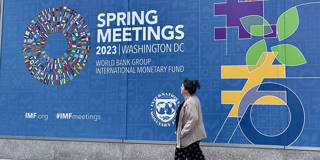New transnational threats such as climate change and pandemics require international financial institutions to redefine the fundamentals of growth, strengthen their operating models, and foster greater international cooperation. With global shocks showing no signs of abating, united action must become the new normal.
WASHINGTON, DC – Nowhere is the impact of recent crises – the lingering economic consequences of COVID-19 and the global spillover effects of Russia’s war in Ukraine – being felt more acutely than in the developing world. People in poor countries are struggling to cope with higher food and fuel prices and unsustainable debt, while schoolchildren are still suffering from learning loss caused by the pandemic. In many places, economic growth has stalled.

WASHINGTON, DC – Nowhere is the impact of recent crises – the lingering economic consequences of COVID-19 and the global spillover effects of Russia’s war in Ukraine – being felt more acutely than in the developing world. People in poor countries are struggling to cope with higher food and fuel prices and unsustainable debt, while schoolchildren are still suffering from learning loss caused by the pandemic. In many places, economic growth has stalled.